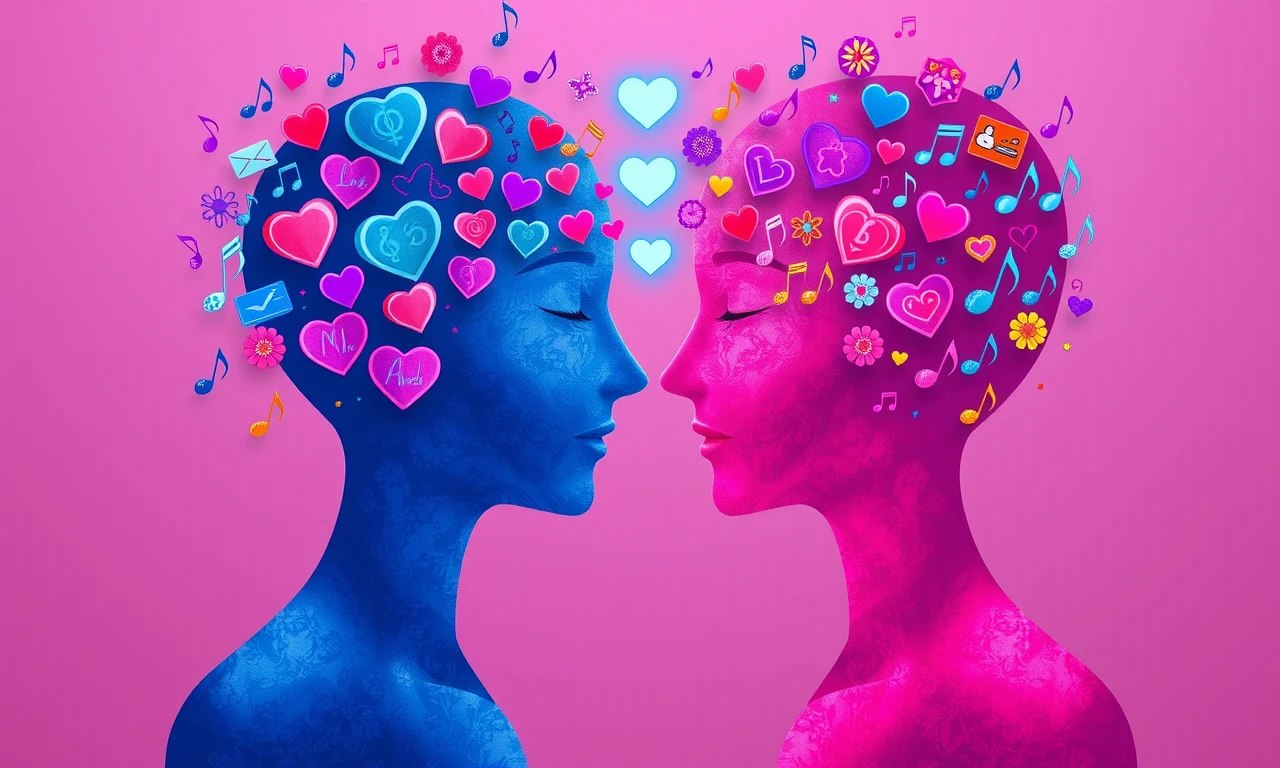In the intricate dance of romance, few moments rival the significance of uttering those three magical words: “I love you.” This pivotal confession marks a transformative juncture in any relationship, igniting a symphony of emotion and anticipation. But who typically takes the plunge first? Recent research challenges long-held assumptions, revealing surprising insights into the dynamics of love declarations.
As we delve into this captivating topic, we’ll explore the delicate interplay of courage and vulnerability that accompanies such a profound expression of affection. Whether you’re teetering on the edge of confession or simply curious about the psychology behind this romantic milestone, join us on a journey to unravel the complexities of saying “I love you” first. Discover how factors like emotional connection, timing, and personal readiness influence this significant moment of intimacy and commitment.
The Surprising Research on Who Says ‘I Love You’ First
A comprehensive study conducted by the American Psychological Association in 2011 challenged conventional wisdom about love declarations. Contrary to popular belief, men are more likely to express their feelings first in romantic partnerships. This revelation upends long-held stereotypes about emotional expressiveness in relationships.
The research, involving a diverse group of participants, uncovered several intriguing insights:
- Male partners often feel more invested earlier, leading to quicker declarations of love
- Men reported higher levels of happiness upon hearing those three words
- Both genders experience a mix of anxiety and excitement before expressing their sentiment
- The timing of love confessions varied based on individual readiness and relationship dynamics
- Fear of rejection influenced hesitation in expressing love for all participants
This study emphasizes that love expressions are deeply personal, influenced by factors such as trust and shared experiences. The researchers found that genuine care and devotion often precede verbal expressions, highlighting the importance of actions in nurturing a strong bond.
Ultimately, the research underscores that sincerity matters more than who says “I love you” first. It encourages openness, honesty, and clear communication in relationships. This surprise finding invites us to reconsider our assumptions and approach love with greater warmth, respect, and bravery.
The study also revealed that the reaction to hearing “I love you” can significantly impact the relationship’s trajectory. A positive gesture or reciprocity can strengthen the emotional connection, while a lukewarm response might lead to uncertainty. This underscores the importance of being prepared for various outcomes when expressing love.
Factors Influencing the Timing of ‘I Love You’
The decision to say “I love you” is influenced by various factors that shape a partnership’s trajectory. While timing varies for each couple, certain elements consistently determine when one feels ready for this profound declaration.
Emotional depth is crucial. As individuals navigate early romance, they build trust and intimacy, creating a safe space for expressing true feelings without fear of judgment or rejection. Shared experiences contribute significantly, serving as a compatibility test and often accelerating affection’s growth.
Personal readiness is perhaps most vital. Each person brings their history and expectations to a relationship. Some express love early, while others need time to process emotions and ensure stability.
Saying ‘I love you’ is a unique journey. It’s about recognizing when your heart is truly ready, not finding a perfect moment. Consider your emotional readiness, shared experiences, and the depth of your connection before taking this significant step.
A partner’s potential reaction plays a crucial role. Fear of unreciprocated love can cause hesitation, while sensing mutual affection may encourage expression. The decision should stem from authenticity and sincerity, not obligation. When the feeling becomes too powerful to contain, it often emerges naturally.
The aftermath can be equally impactful. A positive response reinforces the bond, while a lukewarm reaction might prompt reevaluation. This underscores the importance of preparedness for various outcomes and maintaining open communication throughout.
Ultimately, expressing love verbally should reflect a natural progression of deepening emotions. It’s not a race, but a meaningful milestone in a relationship’s evolution. By considering these factors, individuals can approach this significant moment with confidence and clarity, fostering a stronger foundation for their love to grow.
Gender Differences in Expressing Love
In the realm of love expressions, gender differences reveal intriguing patterns that challenge conventional wisdom. While stereotypes often paint women as more emotionally expressive, recent findings suggest a more nuanced reality. Individuals, regardless of gender, navigate the delicate balance of vulnerability and self-protection when articulating their deepest feelings.
Interestingly, societal expectations can influence how different genders approach love declarations. Some cultures encourage open emotional expression from women while expecting stoicism from men. However, these norms are evolving, with many individuals breaking free from traditional gender roles in relationships.
Communication styles also play a crucial role in how love is expressed across genders. While some prefer grand gestures, others may convey their affection through subtle acts of kindness or quality time spent together. The key lies in understanding and appreciating these diverse approaches to emotional expression.
Timing considerations often differ between genders as well. Some individuals may feel compelled to verbalize their feelings early on, while others prefer to let actions speak louder than words. This variance highlights the importance of patience and clear communication in nurturing romantic connections.
Ultimately, the expression of love transcends gender boundaries. It’s a deeply personal journey influenced by individual experiences, cultural background, and emotional intelligence. By recognizing and respecting these differences, couples can foster stronger, more understanding relationships built on mutual appreciation and support.

As society continues to evolve, so too does our understanding of gender dynamics in love. Embracing this diversity of expression enriches our relationships, fostering deeper connections and more authentic interactions. By moving beyond stereotypes and appreciating the unique ways each individual communicates affection, we pave the way for more fulfilling and equitable partnerships.
Recent research from a prominent university suggests that the act of expressing love is more complex than previously thought. Factors such as personality traits, attachment styles, and past experiences play significant roles in how individuals approach love declarations. This multifaceted view emphasizes the importance of considering each relationship’s unique context rather than relying on gender-based assumptions.
In conclusion, while gender may influence certain aspects of love expression, it is just one of many factors in the intricate tapestry of human relationships. By fostering open dialogue, practicing empathy, and celebrating individuality, couples can create a space where love flourishes, unencumbered by societal expectations or gender stereotypes.
Signs You’re Ready to Say ‘I Love You’
Recognizing when you’re ready to say those three profound words can be a transformative moment in any relationship. While there’s no universal checklist, certain signs often indicate emotional readiness for this significant step:
- You feel a deep sense of comfort and security in your partner’s presence
- Their happiness becomes intrinsically linked to your own
- You find yourself naturally including them in future plans
- Spending time apart feels increasingly difficult
- You’re willing to be vulnerable and share your deepest thoughts
- Their quirks and imperfections become endearing rather than irritating
- You experience a strong desire to support them through challenges
- Physical intimacy feels more meaningful and connected
- You genuinely enjoy participating in their interests and hobbies
- Their family and friends feel like an extension of your own social circle
- You feel proud to introduce them to your friends and colleagues
- You’re comfortable discussing long-term goals and aspirations together
- You find yourself constantly thinking about their well-being
- You’re willing to make compromises for the sake of the relationship
- You feel a sense of peace and contentment when you’re together
Beyond these indicators, it’s crucial to listen to your intuition. When the feeling becomes too powerful to contain, it often emerges naturally. Remember, genuine love is not about finding the perfect moment, but recognizing when your heart is truly ready.
Consider the depth of your emotional connection and shared experiences. Have you weathered challenges together? Do you feel accepted and appreciated for who you are? These factors contribute significantly to the foundation of lasting affection.
Ultimately, expressing love should stem from authenticity and sincerity, not obligation. It’s a personal journey that unfolds uniquely for each individual. Trust in your emotions, but also ensure you’re prepared for various outcomes. Open communication remains key throughout this process, fostering a stronger bond regardless of the response.
Approaches to Saying ‘I Love You’ First
Expressing love for the first time requires thoughtful consideration and a personalized approach. One effective strategy is to create a meaningful moment that reflects your unique bond. This could involve revisiting a special place or planning an intimate activity that holds significance for both of you. By setting the stage, you create an environment conducive to heartfelt expression.
Another approach is to ease into the declaration gradually. Start by sharing specific reasons why your partner is important to you, highlighting qualities you admire and moments that have deepened your feelings. This paves the way for a natural progression towards expressing love, allowing your partner to feel valued and understood.
Some individuals prefer a more direct approach, opting for sincerity and simplicity. In this case, choose a quiet moment when you’re both relaxed and free from distractions. Make eye contact, speak from the heart, and let your genuine emotions guide your words.
The most powerful expressions of love align with your authentic self and resonate with your partner’s emotional language. It’s not about perfection, but about conveying the depth of your feelings with sincerity and care.
Regardless of the method chosen, it’s crucial to be prepared for various responses. Your partner may need time to process their emotions or might not be ready to reciprocate immediately. Emphasize that you’re sharing your feelings without expecting an immediate response, giving them space to reflect.
Ultimately, the most effective approach is one that feels natural and true to your relationship. Trust your instincts, be genuine in your expression, and remember that vulnerability is a strength in matters of the heart.
What to Consider Before Saying ‘I Love You’
Before uttering those three powerful words, it’s crucial to engage in thoughtful introspection. Consider the depth of your emotional connection and the stability of your relationship. Reflect on whether your feelings stem from genuine affection or temporary infatuation. Assess your readiness to commit and your ability to weather challenges together.
Timing plays a pivotal role in this decision. While there’s no universal rule, ensure you’ve shared meaningful experiences and built a foundation of trust. Consider your partner’s emotional state and receptiveness. Are they likely to reciprocate, or might your declaration cause discomfort?
Evaluate your motivations carefully. Are you expressing love out of sincere emotion, or due to external pressures? Avoid making this declaration under the influence of alcohol or in the heat of passion. Instead, choose a moment when you’re clear-headed and composed.
| Key Considerations | Questions to Ask Yourself |
|---|---|
| Emotional Depth | Is this more than just physical attraction? |
| Relationship Stability | Have we weathered challenges together? |
| Personal Readiness | Am I prepared for deeper commitment? |
| Partner’s Receptiveness | Is my partner likely to welcome this declaration? |
| Timing | Have we shared enough meaningful experiences? |
| Motivations | Am I expressing love for the right reasons? |
| Future Vision | Can I envision a shared future with this person? |
| Mutual Respect | Do we value each other’s opinions and boundaries? |
| Emotional Support | Are we there for each other during difficult times? |
Remember, saying “I love you” marks a significant milestone. It’s not just about the words, but the commitment and vulnerability they represent. Consider how this declaration might change your relationship dynamics. Are you prepared for the potential outcomes, whether positive or challenging?
Ultimately, trust your instincts. If you feel a profound connection that transcends physical attraction, if you find yourself consistently prioritizing your partner’s well-being, and if the thought of a shared future brings joy, you may be ready to take this momentous step. However, it’s essential to approach this decision with clarity and authenticity, ensuring that your expression of love aligns with your true feelings and the current state of your relationship.
Handling an Unreciprocated ‘I Love You’
When faced with an unreciprocated “I love you,” it’s natural to feel vulnerable and uncertain. However, this moment can be an opportunity for growth and deeper understanding. First, take a breath and give your partner space to process their emotions. Remember, everyone’s journey to love unfolds at a unique pace.
Instead of retreating, approach the situation with curiosity and openness. Initiate a gentle conversation about your partner’s feelings, ensuring they feel safe to express themselves without pressure. This dialogue can lead to valuable insights about your relationship’s dynamics and each other’s emotional landscapes.
Focus on nurturing your connection rather than dwelling on the lack of reciprocation. Continue showing affection through actions, as genuine care often speaks louder than words. This period can be an opportunity to deepen your bond and build a stronger foundation for future emotional intimacy.

Consider exploring your own emotions during this time. Reflect on why expressing your love felt important and what it means for your personal growth. This self-awareness can be invaluable, regardless of the outcome. It’s an opportunity to understand your own needs and expectations in a relationship.
If the disparity in feelings persists, have an honest conversation about your relationship’s future. Sometimes, unaligned emotional timelines can indicate deeper incompatibilities. However, with patience and understanding, many couples navigate this challenge and emerge stronger. Remember that love is not just about words, but also about actions, support, and mutual respect.
Embrace this experience as a chance to practice emotional resilience and self-compassion. Your feelings are valid, even if they’re not reciprocated in the way you hoped. By handling this situation with grace and empathy, you demonstrate the depth of your character and create space for authentic emotional growth, both individually and as a couple.
The Impact of Saying ‘I Love You’ on Relationship Dynamics
Expressing love for the first time can profoundly transform relationship dynamics. This milestone often deepens emotional intimacy, fostering a sense of security and commitment. Partners may experience heightened vulnerability, leading to more open communication and shared aspirations. However, this shift can also introduce new pressures and expectations, potentially altering the relationship’s pace or intensity.
Positive impacts include increased trust, deeper emotional bonding, and a stronger foundation for future growth. Couples may find themselves more willing to tackle challenges together and invest in long-term plans. On the flip side, premature declarations can create imbalance if feelings aren’t mutual, leading to awkwardness or even relationship strain.
Love expressions are catalysts for change. They can illuminate the path forward or reveal fundamental incompatibilities. The key lies in timing, sincerity, and mutual readiness to embrace the evolving dynamics.
Ultimately, saying “I love you” marks a pivotal moment that can either strengthen bonds or expose underlying issues. It’s crucial to approach this milestone with thoughtfulness, ensuring both partners are prepared for the potential shifts in expectations, commitment levels, and emotional landscape that may follow. This declaration often serves as a turning point, shaping the future trajectory of the relationship.
Frequently Asked Questions About Saying ‘I Love You’
What if my partner says 'I love you' but I'm not ready?
If your partner expresses love before you're ready, respond with honesty and compassion. Acknowledge their feelings while gently explaining your current emotional state. Emphasize your appreciation for the relationship and desire to continue growing together. This open communication fosters understanding and allows both partners to navigate this sensitive situation with respect and care. Patience is key.
Can saying 'I love you' too early ruin a relationship?
Expressing love prematurely can indeed strain a relationship, creating pressure or imbalance if feelings aren't mutual. The impact depends on factors like emotional readiness and communication style. Sincerity and timing are crucial for a positive outcome. However, when approached thoughtfully, this milestone can deepen intimacy and foster growth, transforming the relationship's dynamics positively.
Is it okay to say 'I love you' over text or phone?
While expressing love face-to-face is ideal, modern communication offers alternatives. Texting or calling can be acceptable if distance separates you or in-person meetings are challenging. However, consider the recipient's preferences and your relationship's context. Ultimately, sincerity and thoughtfulness matter more than the medium. Regardless of the method chosen, ensure your words reflect genuine emotions and respect for your partner's feelings.
How do cultural differences affect saying 'I love you'?
Cultural differences profoundly shape love expressions worldwide. Some societies cherish verbal declarations, while others emphasize actions. Asian cultures often favor subtle gestures, contrasting with Western preferences for explicit statements. The timing, context, and acceptable methods of conveying affection vary significantly, mirroring diverse cultural values. These distinctions highlight the rich tapestry of human emotional communication across global communities.

Jeffrey Young is an American psychologist renowned for developing schema therapy. He founded the Schema Therapy Institute and is a leader in the field of cognitive behavioral therapy. Young has authored several influential books, including Schema Therapy for professionals and Reinventing Your Life for the general public.







